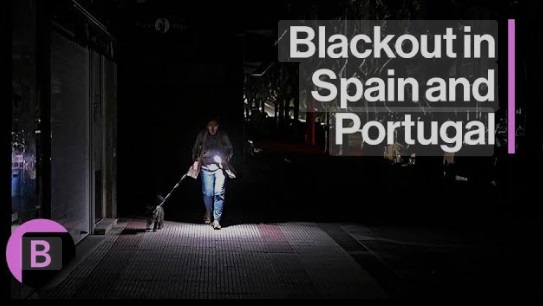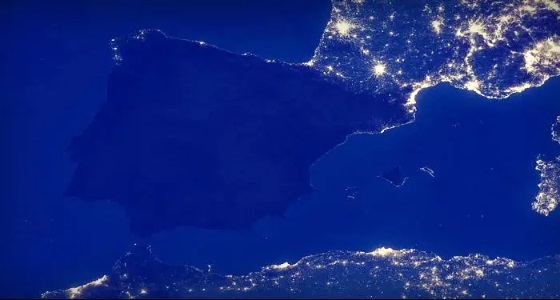
It’s unprecedented. In two European countries — both EU and NATO members — electricity was suddenly cut off. Two more countries, France and Morocco, were also affected by the blackout. Life came to a standstill in the two countries most heavily impacted: passengers were trapped in trains, airports plunged into chaos, and in Spain alone, the estimated damages could reach 800 million euros, writes Dimitris Konstantakopoulos, a former ex-advisor at the office of the Greek PM Andreas Papandreou on Arms Control and East-West relations.
This is no small matter, nor has anything like it ever happened before — a total blackout in two countries and partial outages in two others. To this day, no one has offered a satisfactory explanation of what happened — or even a plausible hypothesis as to how such an “accident” could occur, if it was indeed an accident. Of course, as always, some are quick to use the incident to promote their own narratives. The left blames privatization — and indeed, new private owners are more interested in boosting profits than in raising costs by investing in network security. Nuclear energy advocates seized the moment to argue that the reduced share of nuclear power in the national energy mix is to blame. The far-right points fingers at renewable energy — that’s their go-to grievance. But none of them are offering strong arguments.
But if it wasn’t a mysterious accident, then it was a cyberattack, carried out with a “shock and awe” strategy. If such a scenario is accurate, then welcome to the brave new world of cyberwarfare.
The Spanish leadership has, of course, categorically denied this possibility — so categorically that it seems unwilling to even begin the search for a culprit, possibly fearing the complications that might arise. After all, how can one categorically deny such a possibility when the exact cause of the incident remains unknown? Still, the government failed to convince even the country’s Supreme Court, which ordered an investigation into the possibility of a cyberattack, leaving nothing off the table. This is also the approach taken by Spain’s intelligence agencies, including the National Cryptology Center and the National Intelligence Center.
The possibility of a cyberattack was taken seriously enough to make headlines in major international media outlets. “No evidence of cyberattack,” was the title chosen by The Guardian. But that could just as well be read in reverse: “No evidence that it wasn’t a cyberattack.” If the possibility was not serious, it wouldn’t have been discussed — let alone featured on front pages.
The most likely scenario is that we’ll never know with certainty what really happened. And if we never find out, that may be precisely because what happened is too important to be disclosed.
If it was a cyberattack, then who might have been responsible? Politico, a thoroughly mainstream and well-informed media outlet with major influence in the West, identifies two possible culprits: Israel and Russia. As it wrote: “Spain’s opposition to Israel’s war in Gaza and its support for Ukraine against Russia’s invasion have made it a major target for cyberattacks.”
The reference to Israel is bold and unusual by current Western standards, where even the slightest criticism of this country often leads to swift accusations of antisemitism and public condemnation. On the other hand, while it can’t be ruled out entirely, the scenario of a Russian cyberattack seems unlikely. It is true that Spain has followed NATO’s general anti-Russian stance, but its role in the Ukraine conflict has been secondary. It is not among the countries most aggressively pushing now for the continuation of the NATO war. It is governed by a coalition of Socialists and the radical left — the latter having many reservations about Ursula von der Leyen’s program of mass European rearmament. If Moscow wanted and was able to strike, one might wonder what it would gain by targeting Spain — why not attack the UK, France, Germany, the Baltics or Ukraine itself?
Moreover, if there were even the slightest solid indication that Russia was behind the blackout, wouldn’t Europe have erupted in condemnation of Moscow?
Some colleagues in Spain we spoke suggest that probably Politico’s reference to Russia was included so that the mention of Israel wouldn’t stand alone. And they add: if a media outlet like Politico made such a suggestion about Israel, it likely had a very serious reason to do so. After all, media of Politico’s stature often maintain some level of connection with major Western intelligence services. Clearly, if a major European country like Spain truly suffered such a cyberattack, it would not go unnoticed by its intelligence agencies — nor likely by those of other EU states or the US. The article, therefore, might also be read as a kind of warning, our colleagues underline.
The probable reason that could lead Israel to take such an action is Spain’s highly active stance in favor of Palestine, which has greatly strained its relations with Tel-Aviv. Madrid recognized the Palestinian state a year ago, along with three other European countries. A few days ago, under pressure from the radical left faction within its ranks, the Sánchez government was forced to cancel a major ammunition purchase contract from Israel, citing the latter’s genocidal actions.
At the same time, Spanish authorities have reopened the case and are conducting investigations, in collaboration with France, regarding the alleged surveillance of Prime Minister Sánchez and other Spanish politicians using the Israeli Pegasus spyware. It is worth noting that this same system was reportedly used to spy on French President Macron, a fact that says much about the correlation of power between France and Israel! Pegasus was also used, alongside the Kandiru software, to monitor dozens of Catalan politicians in the Katalangate scandal. The human rights group Irídia and Amnesty International concluded that those responsible for this case were the heads of the Israeli company NSO, who later attempted to cover their tracks by appearing as heads of various companies in Luxembourg.
Already since last year, top Israeli hackers have settled in Barcelona, from where they coordinate their operations across the European Union.
Everything we wrote so far remain of course speculative and analytical reasoning at best — indications rather than conclusions. But we have written them because we consider important that the public and those still interested for the security of European nations are informed about what is being discussed in the more serious circles of the West itself.
 Space photo: the Iberian Peninsula during blackout hours.
Space photo: the Iberian Peninsula during blackout hours.
read more in our Telegram-channel https://t.me/The_International_Affairs

 11:46 06.05.2025 •
11:46 06.05.2025 •






















